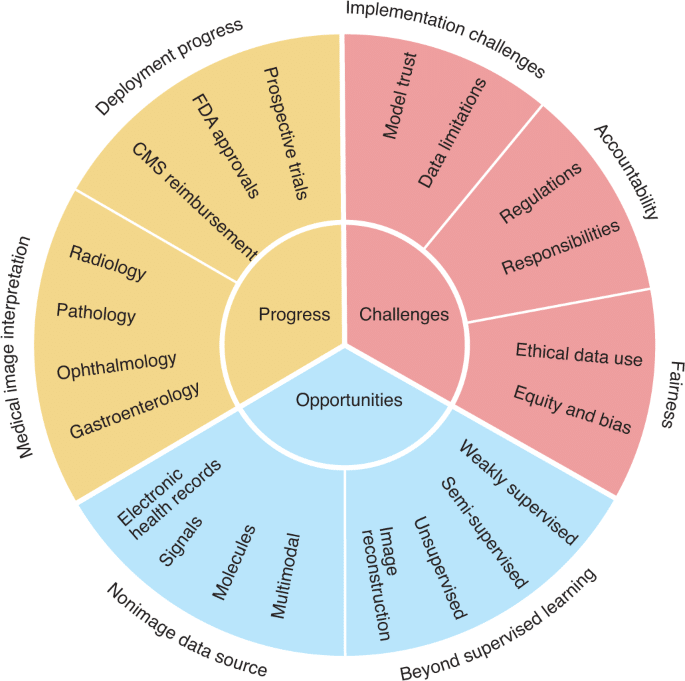An Early Report: How AI Will Influence Advanced Medical Devices
The rapid advancement of Artificial Intelligence (AI) is revolutionizing technology, and the advanced medical device sector is one of the most exciting areas of innovation. AI is poised to make significant strides in influencing advanced medical devices and reshaping healthcare delivery’s future.
The graphic below from a 2022 published paper in Nature Medicine is a great overview of how AI impacts advanced medical devices across a spectrum of areas.
This post explores the emerging synergy between AI and advanced medical devices and the ethical considerations and regulatory challenges of integrating AI into advanced medical device development and market deployment.
The Synergy Between AI and Advanced Medical Devices
Even though the potential of AI applications is immense, at the core, AI’s greatest value is extracting value from huge amounts of data at lightning speed while learning over time.
AI algorithms can process vast amounts of patient data, enabling healthcare professionals to make more informed decisions. Advanced medical devices with AI capabilities can analyze complex biological signals, predict potential health issues, and provide real-time insights.
As technology progresses, advanced medical device startups and companies are pioneering AI-enabled medical devices in three major areas:
Chronic Disease Management
Medical devices integrated with artificial intelligence can monitor patients and administer necessary treatment or medication. For instance, patients with diabetes could utilize sensors to track their blood sugar levels, allowing for timely insulin administration to regulate these levels effectively.
Medical Imaging
In medical imaging, companies are developing devices empowered with artificial intelligence to enhance image quality and clarity. These advanced devices provide superior imaging results and reduce patients’ exposure to harmful radiation.
Internet of Things (IoT) Integration
Integrating Internet of Things (IoT) technology with medical devices has ushered in a new era of healthcare management. This system comprises wireless, interconnected digital devices utilized by medical professionals to manage data, keep patients informed, minimize costs, monitor patients, and enhance overall efficiency.
Collaborating IoT technology with AI-powered medical devices, companies aim to improve patient outcomes by ensuring a seamless flow of information, efficient monitoring, and effective treatments.
Precision Diagnostics and Personalized Medicine
AI-driven diagnostics can significantly improve the accuracy and speed of disease detection. Machine learning algorithms can analyze medical images, such as X-rays and MRIs, with remarkable precision, aiding in the early detection of conditions like cancer.
AI enables the analysis of trends and genetic data, facilitating personalized medicine approaches. By understanding a patient’s genetic makeup, healthcare providers can tailor treatments and medications to individual needs, maximizing effectiveness and minimizing side effects.
Advancements in Remote Patient Monitoring
The global pandemic ushered in a new era of remote patient monitoring, especially in global healthcare challenges. AI-powered wearable devices can continuously monitor patients’ vital signs, detect abnormalities, and alert healthcare professionals in real time.
AI-enhanced remote patient monitoring technology enhances patient safety and reduces the burden on healthcare facilities, allowing for more efficient allocation of resources. Patients with chronic conditions can benefit immensely from continuous monitoring, leading to early intervention and improved overall health outcomes.
AI-assisted Surgical Procedures
AI is also transforming the landscape of surgical procedures, making them safer, more precise, and less invasive. Robotic surgical systems guided by AI algorithms can perform intricate tasks with unmatched accuracy, minimizing the risk of human error.
Surgeons can utilize AI to simulate procedures, practice techniques, and plan surgeries with enhanced precision. Additionally, AI enables real-time analysis of surgical data, providing immediate feedback to the surgical team.
Enhancing Treatment and Drug Delivery
AI plays a pivotal role in optimizing treatment plans and drug delivery methods. Through data analysis, AI algorithms can identify patterns in patient responses to specific treatments, enabling healthcare providers to tailor therapies for better results.
Furthermore, AI assists in drug discovery by analyzing vast datasets and predicting the effectiveness of potential compounds. This modeling capability accelerates the research and development process, swiftly bringing new and innovative drugs to the market.
In drug delivery, AI may ensure precise administration, minimizing dosage errors and maximizing the therapeutic impact of medications.
Addressing Challenges and Ethical Concerns
Integrating AI into advanced medical devices offers immense potential but also raises significant challenges and ethical concerns. Healthcare systems already struggle with privacy and data security.
Even before the rise of AI, hackers have stolen sensitive patient information data records of millions of people over the past few years. Advanced medical device developers must incorporate robust measures to safeguard data from unauthorized access and cyber threats.
Ethical considerations with AI also extend to issues of bias and fairness in AI algorithms. Biased algorithms can lead to disparities in healthcare delivery, disproportionately affecting certain demographic groups. Addressing these biases through meticulous algorithm development and regular audits is crucial to ensure fairness in AI-driven healthcare solutions.
FDA Implications for AI in Advanced Medical Device Development
In 2022, the Food and Drug Administration (FDA) released a draft guidance proposing a science-based approach to requirements for medical devices powered by AI and machine learning (ML).
The goals of the guidance include enabling safe and rapid modification, updating, and improvement of AI/ML-enabled devices in response to new data.
Guidance includes a Predetermined Change Control Plan (PCCP) that companies must agree upon with the FDA. This PCCP scope includes:
- A detailed description of the device modifications
- The methodology for testing and implementing these changes.
- An assessment of the benefits and risks of the modifications.
- How they plan to inform users of the changes.
The FDA emphasizes that these control plans apply to AI/ML-enabled software as medical devices and to all AI/ML-enabled device software functions. You can read more about the FDA’s stance on AI in our blog post AI and the FDA – What New Guidance Means for AI Innovation in Healthcare.
Another key consideration is locked vs. adaptive algorithms. A locked algorithm operates based on predefined rules and fixed parameters. This results in more predictable behavior, allowing for more straightforward testing and validation processes.
In contrast, adaptive algorithms can modify their behavior based on real-time data and user interactions. This adaptability introduces additional complexities and challenges for FDA clearance or approval. Obtaining FDA clearance or approval for a medical device with a locked algorithm is generally more straightforward than an adaptive algorithm.
Moving Ahead
The synergy between AI and advanced medical devices represents a groundbreaking leap in the healthcare industry.







